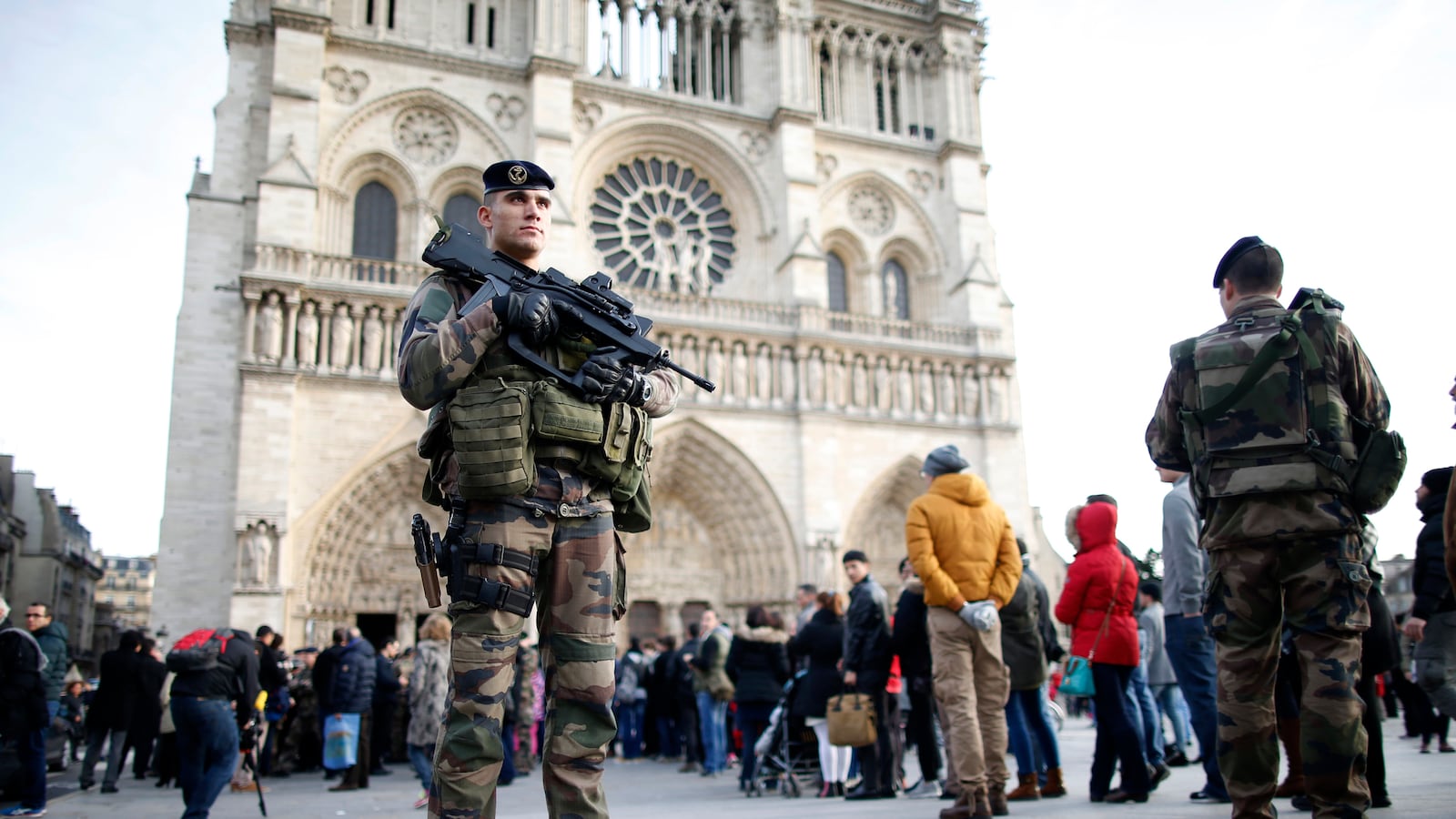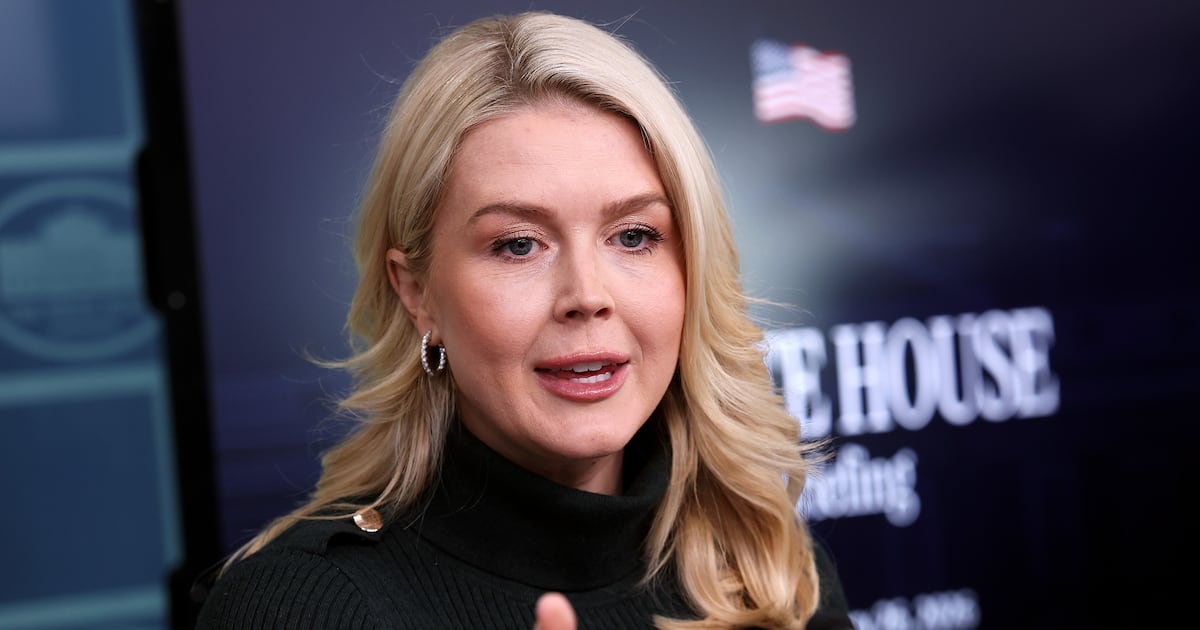The probable attack was uncovered in Paris on Sunday morning, at about 7 a.m., but the average citizen did not hear about it until Wednesday when French news outlets reported it as the confiscation of a car filled with seven propane tanks on a street near Notre Dame cathedral.
No detonators or other explosive devices were found inside, but documents in Arabic were.
The vehicle, a Peugeot 607, raised suspicions in the 5th arrondissement because it had been parked improperly with its lights still on and the license plates had been removed, possibly because the car had been listed as stolen.
Then, late Tuesday evening, two unnamed suspects, a 34-year-old man and a 29-year-old woman, both known to France’s domestic intelligence service, as BFMTV reported, “for espousing the ideology of Daesh,” were taken into custody at police headquarters, where they remain as of this writing.
Little else is known about them or their connection to Daesh, which is the impolite Arabic acronym for the Islamic State, or ISIS.
Were these operatives, like the previous Paris attackers led by Abdelhamid Abaaoud, trained up in Syria and dispatched back into the Continent to lie in wait until called upon to execute their ghastly mission? Or were they “lone wolves” or “stray dogs” merely inspired by ISIS to commit mass murder, in this case against a cosmopolitan world capital in a popular tourist destination where many practicing Catholics would be attending Mass on Sunday?
This is the way we live now, in fear of the next headline from anywhere on planet Earth heralding another near miss or stunningly successful atrocity. And the Notre Dame plot, if we can safely assume it was a plot, came just days after the confirmed demise of the veteran jihadist who arguably did the most to transform the age of sacred terror into a new age of anxiety.
Abu Muhammed al-Adnani’s last communique as ISIS’s spokesman and overseer of international operations came in late May of this year. Anticipating the further loss of cities and villages, he cautioned the faithful not to despair and again emphasized the exportation of holy war as an obligation of all Muslims, a motif that has been serially mischaracterized in the media as a shift or pivot in ISIS’s long-term strategy.
In reality, it is the culmination of a long-held fever dream of world domination, one that began in the late 1990s and was intermittently implemented, mainly in Mesopotamia and the Levant, under the guidance of the Jordanian Abu Musab al-Zarqawi, the founding father of ISIS’s first incarnation, al-Qaeda in Iraq.
Zarqawi’s expansionism was ultimately apocalyptic: He was fond of citing a hadith, or saying attributable to the Prophet Muhammed, that foretold the inevitable clash between the Armies of Rome and the Armies of Islam in a scruffy little town in the Syrian province of Aleppo known as Dabiq, now also the name of ISIS’s two-year-old propaganda magazine. “The spark has been lit here in Iraq,” Zarqawi said, in one of his own sayings that has furnished the epigraph of every issue of this grim periodical, “and its heat will continue to intensify—by Allah’s permission—until it burns the crusader armies in Dabiq.” (ISIS holds Dabiq, although in the coming weeks it will likely lose it either to American-backed Kurdish guerrillas or Turkish-backed Arabs rebels, assuming they’re not too busy fighting each other.)
Lately, Zarqawi’s fever dream has been reified as a declaration of total war against disbelievers wherever they may be and as his early recruit and confidant Adnani envisaged. Does this mean then, in the near term, that ISIS envisages driving Abrams tanks and Humvees down Pennsylvania Avenue or the Champs-Élysées the way it drove them into Mosul two years ago? No. It means sowing mayhem and destruction in the Land of Disbelievers and watching these societies cannibalize themselves in advance of the future Islamic conquest. The sequence of war was written up centuries ago.
“O soldiers of the Islamic State,” Adnani intoned in May, “examine and tend to your intentions! Mend your thoughts! And be happy with the news that you are supported by Allah, for verily we are upon clear guidance and we were not deceived. By Allah, we were not deceived. Give the news to Al Salul [an impolite way of referring to the Saudi monarchy] of that which will soon harm them, by Allah’s permission. They will be the first to be defeated, if Allah wills… Though the fuqaha [jurisprudents] of old differed about the meaning of conquering the Arabian Peninsula, its meaning today is very clear! Our Prophet was truthful and did not lie. Determination! Determination! You— on behalf of the Ummah— are fighting against all nations. If you are resolute, you will win. If you flinch, you will fail and lose.”
This injunction to kill wantonly in Saudi Arabia came after a more infamous one, delivered in 2014, in which Adnani encouraged Muslims to shoot, stab, bludgeon, or run over infidels in the West.
So came the question: Was the updated sermon a geographical relocation of ISIS’s international priorities? Was taking the fight to the Wahhabist kingdom, where during the holy month of Ramadan this year the agents of Adnani struck near the U.S. consulate in Jeddah, blew up a Shia mosque in Qatif, and horrified even Salafi-jihadists by setting off a bomb in Medina, near the burial site of the Prophet Muhammed, now of greater urgency than destroying the “filthy French”?
And what did Adnani mean by age-old clerical disputes about conquering the Arabian Peninsula?
He was alluding to a hadith, which runs thus: “You will attack Arabia and Allah will enable you to conquer it, then you would attack Persia and He would make you to conquer it. Then you would attack Rome and Allah will enable you to conquer it, then you would attack the Dajjal [Islam’s version of the AntiChrist] and Allah will enable you to conquer him.”
In a second, clarifying hadith, the Prophet is asked which city will be conquered first: Rome or Constantinople, used here as a synecdoche for Byzantium, which at the time included parts of the contemporary state of Syria. Muhammed responds that “the city of Heraclius” will be conquered first, meaning Constantinople.
As it happens, this second hadith closes out the inaugural issue of Rumiyah, or Rome, ISIS’s newest propaganda magazine (PDF), which was hastily edited and rushed into publication this week in order to eulogize Adnani and expand on his encompassing definition of those marked for death. Who are these unlucky many, exactly? An unsigned article at the back of the book entitled, “The Kafir’s Blood is Halal For You, So Shed It,” helpfully provides a detailed set of answers.
ISIS’s targets around the world are the mushrikin, or polytheists, who do not fall under the category of people with a valid covenant, or non-Muslims who believe in the one true God and are thus eligible to inhabit in Muslim lands in a state of dhimmah, second- or third-class citizenship, provided they abide by sharia law and pay jizya, the tax levied against them. Needless to add, the majority of Christians and Jews do not live nor wish to live under such conditions.
ISIS grades into hermeneutical specifics, legitimating their spate of terrorist attacks against anyone who wittingly or unwittingly serves as an accomplice to the disbelievers: In practice, this could be any person who is not an agent of ISIS living in any country with an army or air force participating in the coalition war—or even any country sitting out that war and yet still culpable for “tyrannical” practices. Adnani did not exaggerate when he said that ISIS was fighting “all nations.”
Rumiyah notes, this time quoting the Quran, that once the “sacred months” have passed, it is the duty of Muslims to “kill the mushrikin wherever you find them and take them, surround them, and wait for them at every outpost.”
Women and children needn’t be killed, Rumiyah explains, not because doing so is inherently evil but because it is inexpedient. “Our opinion regarding this—and Allah knows best—is that the restriction exists so that they can become slaves, which is more beneficial than killing them, and killing them does not harm the enemy; so making them slaves is more optimal than killing them,” the article states, no doubt keeping in mind the still-thriving trade of sex slaves and the possibility for brainwashing prospective “cubs of the Caliphate” to carry out martyrdom operations.
As for those with a valid covenant who nevertheless consort with the people “at war” with Muslims or voluntarily fight with them or help them in any way—well, these, too, are slated for extermination. ISIS cites a Sunni jurisprudent of the Hanafi school who explains: “So the priest and wandering ascetic who mix with the people are to be killed, as are those who have fits of insanity, and the deaf and mute, and the one with a severed hand or foot, even if they did not fight. This is because they are from the same people who are at war [with the Muslims].”
In other words, this is how ISIS determines that Catholics worshipping at Notre Dame, or tourists wandering by, can be murdered with impunity even if they are monotheists. Their crime is to be in Paris and not Raqqa.
For all Muslims consigned to inhabit the realm of the kufar (i.e. anywhere ISIS does not reign), they “must be reminded that the blood of the disbelievers is halal and killing them is a form of worship to Allah, the Lord, King, and God of mankind.”
Here, too, ISIS has a rather baggy definition of viable victims; it includes “the businessman riding to work in a taxicab, the young adults (post-pubescent ‘children’) engaged in sports activities in the park, and the old man waiting in line to buy a sandwich. Indeed, even the blood of the kafir street vendor selling flowers to those passing by.” Rumiyah insets a photograph of the now-shocked 64-year-old English florist Stephen Leyland, who professes to cater to “footballers' wives” and to not know any jihadists, by way of example.
Whereas the U.S.-led coalition may strive (with mixed result) to avoid civilian casualties in favor of ensuring only armed jihadists get bombed or shot, ISIS is bound by no such humane restriction.
“There is no shar’i requirement to target soldiers and policemen nor judges and politicians, but all kufar who are not under the covenant of dhimmah are fair game. How can the disbelievers ever dream of safety and security while Muslims are anywhere in the world and while the rule of Allah is mockingly replaced by manmade monstrosities of democracy?”
Such are the ideologized terms of the so-called Islamic State’s asymmetric jihad contra mundum.






